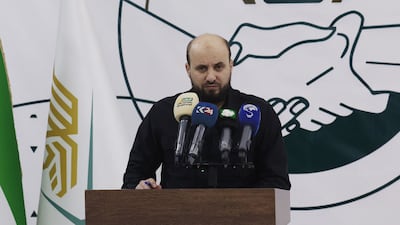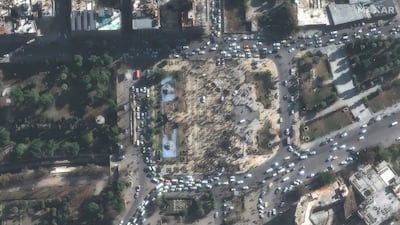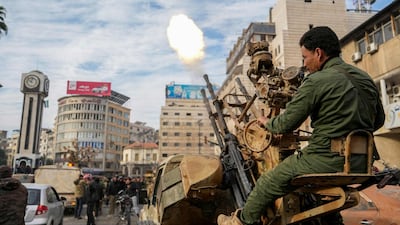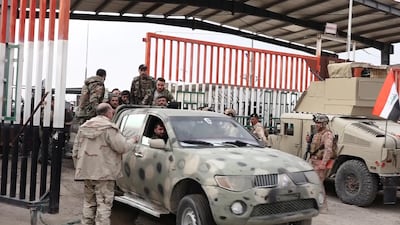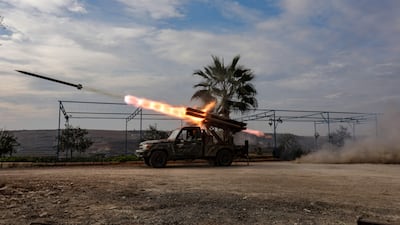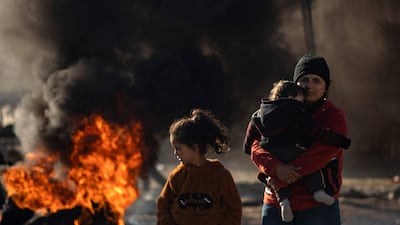Syria entered uncharted political waters on Sunday after the collapse of the 24-year rule of Bashar Al Assad under a rebel advance so swift even his allies in Moscow and Tehran failed to prevent it.
The president left the country by plane to an unknown destination hours after rebels overran the city of Homs, Arab officials said. The capture of Homs cut off the supply line from his seat of power in Damascus to the Alawite Mountains, the ancestral home of the Alawite minority that has dominated power in majority-Sunni Syria for the last six decades.
“Freedom, freedom,” shouted crowds in the main Umayyad Square in Damascus, a few blocks from Mr Assad’s home, as the fireworks lit the night sky.
The downfall of Mr Al Assad undermines years of methodical work by Russia and Iran to expand in the Middle East and weakens the US. He was a crucial link in an uneasy alliance but differed on how much Iran could use Syria as a launch pad to threaten Israel. The Russian and Iranian military presence had reportedly shrunk in Syria in the last week as the iron grip of the regime loosened.
Over the past 12 days, thousands of political prisoners in jails and secret police dungeons were freed after security forces abandoned their positions in the cities of Aleppo, Hama, Homs and finally Damascus. The high-walled compounds and security towers underpinned the iron rule of Mr Assad and before him his father Hafez Al Assad, who came to power in a 1970 military coup that deposed another Alawite officer. Posters and statues of the father and the son, symbols of the decades-long personality cult, came down.
“The minimum amount of bloodshed that has been spilt in the past several days leading to regime’s downfall tells you about the direction Syria is heading,” said Fawaz Tello, was jailed for five years for leading the pro-democracy Damascus Spring movement shortly after Mr Assad came to power in 2000.
The rebels are led by Hayat Tahrir Al Sham, an Al Qaeda offshoot with links to Turkey. Its leader Ahmad Al Shara, formerly known as Abu Muhammad Al Julani, has instructed the rebels to keep the civil department of the government under the supervision of the last prime minister who served under Assad. Mr Al Shara recently abandoned his nom de guerre, to project an image of moderation, although his organisation is listed as terrorist the US and Europe.
“The message is to maintain continuity of state functions and avoid violence,” Mr Tello said from Berlin, adding that Mr Shara is “currently the leader of the revolution” but that he will become a civilian figure.
“He can run for elections in the new, democratic Syria,” Mr Tello said, adding that core supporters of Mr Assad, who are mainly Alawites, can join in “building the new Syria if they don’t have blood on their hands".
“All what they need to do is to say sorry,” Mr Tello said.
Syria was the last country whose population arose in the wave of Arab uprisings a decade ago. The regime used deadly force to suppress the protest movement that began in March 2011, killing thousands of civilians and prompting a violent backlash by members of the Sunni majority. By the end of it, Syria was in civil war. The country fragmented into Russian, Iranian, US and Turkish zones of control, manned by the proxies of each country.
Ahmad Tumeh, who fled to Turkey to escape persecution after leading the pro-democracy movement in eastern Syria in 2011, said that the rebels “have learnt the lesson” from the disintegration of some states after the Arab uprisings.
“They will avoid chaos. Syria is on its way of becoming a pluralistic, tolerant state,” he said. “What happened has already proved that the Syrian people are capable of miracles."




